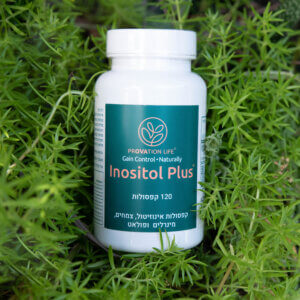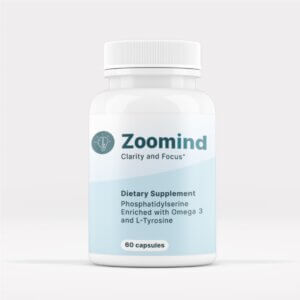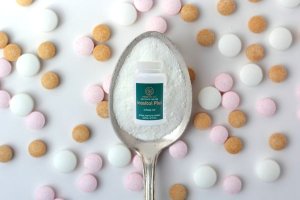
While PCOS turned out not to be my issue, I’m still taking Inositol for a little while longer before rechecking my hormones to see if there has been any improvement. While doing so, I think the information about this supplement is worth sharing. As I explored how Inositol’s benefits include balancing hormones and supporting ovulatory function, I found valuable insights that could help others facing similar challenges. I’m eager to share what I’ve learned about how I could tackle PCOS naturally.
Understanding PCOS
Polycystic ovary syndrome, or PCOS, is a common health issue that is estimated to affect between 8% and 13% of women, especially those who are of childbearing age. Still, it is now evident that PCOS does not disappear as women get into menopause. It usually begins during the teenage years, with symptoms that can vary as time goes on. The exact cause of PCOS is not known, but it is known that insulin resistance can increase the risk of developing it, and it can run in families.
Women with PCOS often experience hormonal imbalances that lead to irregular menstrual cycles. These irregular periods usually occur because of a lack of ovulation, making it harder for women to get pregnant, which is why PCOS is a major cause of infertility.
PCOS is known for causing higher levels of certain hormones, like luteinizing hormone (LH), leading to too many male hormones and an imbalance between LH and another hormone called follicle-stimulating hormone (FSH).
Over time, various methods have been explored to ease the symptoms of PCOS. While there is no cure, many of its symptoms can be managed. Making changes in diet and lifestyle, taking certain medications, and undergoing fertility treatments can tackle PCOS naturally, and now there is more research coming out about fertility supplements and natural PCOS treatments such as Inositol.
Understanding PCOS and its Symptoms.
Not all women with PCOS experience the same symptoms, and the severity can vary. Some may only have period issues or struggle with conceiving. Common signs include irregular or absent periods, fertility problems due to irregular ovulation, excessive hair growth on body areas like the face and chest, weight gain, hair thinning, oily skin, and acne. If you notice these signs, it’s best to speak with your doctor about the possibility of PCOS.
PCOS may also lead to feelings of worry, sadness, and not feeling good about your body. Trouble getting pregnant, being overweight, and having hair where you don’t want it can cause feelings of being different and unattractive. This can impact how you get along with family and friends, your job, and being part of your community. However, it is good to remember that PCOS is a common condition, there are ways to tackle PCOS naturally, and you are not alone. In fact, plenty of resources and support groups for PCOS are available!
Medical interventions for PCOS include medications, both hormonal and non-hormonal, weight loss, or surgery. No single treatment is a cure-all, as existing treatments have focused on alleviating symptoms rather than targeting the syndrome directly. Therefore, incorporating PCOS natural treatments, such as lifestyle changes and fertility supplements, can be beneficial.
FAQ: How exactly does PCOS cause infertility?
Keeping hormones balanced is vital for regular menstrual cycles and optimal fertility. Different hormones, like estrogen and progesterone, control the menstrual cycle, which team up to prepare the body for pregnancy. PCOS in women disrupts the hormonal balance, affecting the egg growth and release process in the ovaries and hindering ovulation. Without ovulation, conception is not possible.
Benefits of Inositol as a Natural Solution 
The benefits of Inositol for hormone regulation and ovulatory support are particularly noteworthy. Inositols are natural compounds found in almost all living things and were first discovered in muscle tissue over 150 years ago. They’re similar to glucose in their structure and play key roles in the body’s processes. Myo-inositol (Myo-Ins) and D-chiro-inositol (D-Chiro-Ins) are the most common among the different types of inositols. They help with various body functions, including hormone regulation and insulin activity.
Women with PCOS often have issues with how their bodies use inositols, leading to problems with insulin and hormone levels. Myo-Ins help the body use glucose, while D-Chiro-Ins is involved in storing energy. In PCOS, there’s often an imbalance between these two, which can affect ovulation and lead to insulin resistance.
Supplementing with Myo-Ins extends beyond hormone regulation; it also improves insulin sensitivity and menstrual cycles in women with PCOS. A specific ratio of 40:1 (Myo-Ins to D-Chiro-Ins) is considered effective, particularly for overweight or obese women. This combination is also helpful in improving egg quality during fertility treatments. Importantly, health authorities like the FDA regard Myo-Ins as safe.
Research on mice showed that this 40:1 ratio can reverse some hormonal imbalances in PCOS. For people who don’t respond well to inositol alone, adding a protein called α-lactalbumin may help. This combination has been shown to improve the absorption of inositols, leading to better outcomes, like improved ovulation rates and healthier hormone levels.
And what about the plus? Inositol plus is not just one thing but a blend of nine substances that collaborate to rebalance androgen and estrogen hormones. Its components include Myo-inositol, chromium, cinnamon, magnesium, potassium, zinc, folic acid, turmeric, and Coenzyme Q10 (CoQ10).
FAQ: How long does it take to see results with Inositol Plus?
Results can vary, but many users who tackle PCOS naturally by taking Inisotol start to see changes within a few months of consistent use.
FAQ: Are there any side effects of taking Inositol Plus?
Mild side effects from inositol supplements may include diarrhea, nausea, abdominal pain, fatigue, headache, and dizziness. Starting with a lower daily dose can help prevent these effects.
Benefits of each key ingredient in Inositol Plus
- Myoinositol helps even out hormones by lowering male hormones like testosterone. It can also help restore menstrual cycles to normal and make it easier to get pregnant naturally by improving progesterone levels.
- Cinnamon can help regulate periods for women with irregular cycles and may make the body respond better to insulin.
- Chromium might help with hormone balance by making the body less resistant to insulin and improving cholesterol levels.
- Curcumin could help manage hormonal and metabolic issues by improving how the body handles sugar and fats without causing significant side effects.
- Folic Acid can increase the chance of conception and reduce the risk of ovulatory infertility.
- Zinc can help lower male hormones and boost ovarian function by increasing progesterone, which naturally blocks male hormones. It also reduces the conversion of testosterone into a stronger form.
- Magnesium might help balance hormones by lowering body weight and testosterone and increasing DHEA, which can improve overall hormone levels.
- Co-Enzyme Q10, along with folic acid, is beneficial for women with PCOS, improving symptoms specific to the condition.
- Potassium is recommended for women with PCOS as low levels can worsen inflammation associated with the condition.
FAQ: Can Inositol help with IVF?
Research generally suggests that supplements can help improve the success of IVF treatments. One study looked at 935 people and found that Myo-inositol increased the chance of pregnancy by about 6% and lowered the risk of miscarriage by 27%. While it seems helpful for women undergoing IVF or similar procedures, the best amount and type of Myo-inositol to use aren’t clear yet, so more research is needed. The study also found that taking 4000 mg of Myo-inositol with 400 mcg of folic acid can boost pregnancy and live birth rates in IVF cycles. Some studies have seen similar improvements with 2000 mg.
Other Ways to Improve Fertility Naturally
Fertility supplements, including those that highlight Inositol benefits, are gaining popularity for their role in PCOS natural treatment. There are hundreds of brands with a plethora of different nutritional or herbal compounds. So, how do you separate the things that work from those that don’t? A few key pointers. Look for supplements backed by scientific evidence and select high-quality, reputable brands that adhere to good manufacturing practices. Regulatory bodies like the FDA monitor supplement safety, so stay informed about any recalls or warnings. It is also good to start with one product at a time and track health changes to see if the supplement is working for you.
Aside from supplementation, some other ways to tackle PCOS naturally I came across that I think are also worth looking into are:
- Diet changes: Eat whole foods and avoid processed items. It helps manage PCOS symptoms by balancing hormones and reducing inflammation.
- Anti-inflammatory diet: Adopt an anti-inflammatory diet like the Mediterranean diet to alleviate PCOS symptoms.
- Add fiber: Foods high in fiber, such as lentils and broccoli, help regulate digestion and blood sugar.
- Probiotics: Support digestion and hormonal balance with foods like kimchi.
- Maintain a healthy weight: Weight management can improve insulin resistance and regulate periods.
- Balanced exercise: Gentle exercises like yoga can help maintain weight without disrupting hormones.
- Good sleep habits: Aim for eight to ten hours of sleep to help manage stress and hormone levels.
- Reduce Stress: Incorporate relaxation techniques to lower cortisol and manage PCOS symptoms.
- Avoid endocrine disruptors: Be cautious with bisphenol A (BPA) products, which can interfere with hormones.
- Consider acupuncture: It may help improve blood flow, reduce cortisol, and enhance insulin sensitivity in PCOS management.
Ready to try Inositol Plus? First, explore our detailed resources to discover how it can support your health journey. Visit the manufacturer’s website or YouTube channel to learn more, or consult your healthcare provider to see if Inositol Plus could be the right way to improve fertility naturally.







